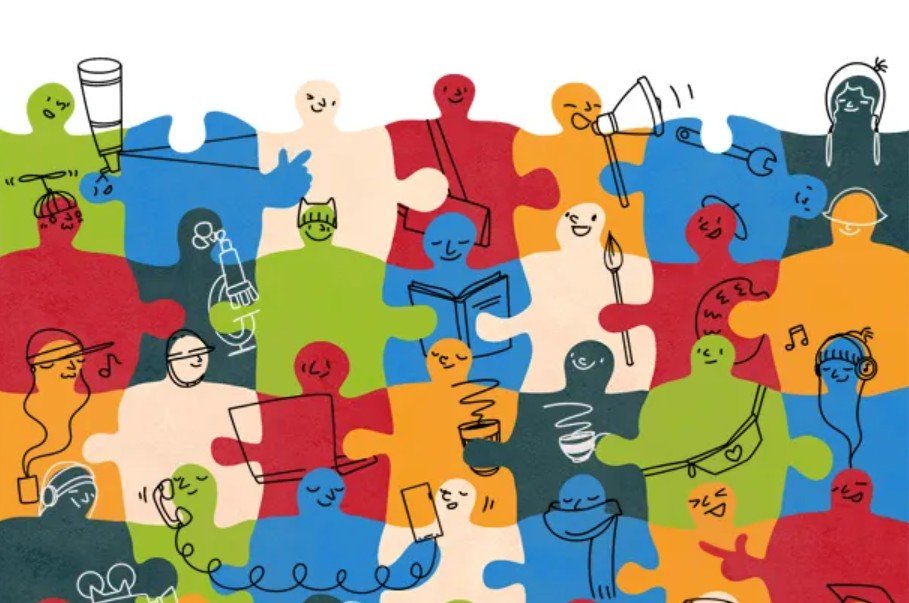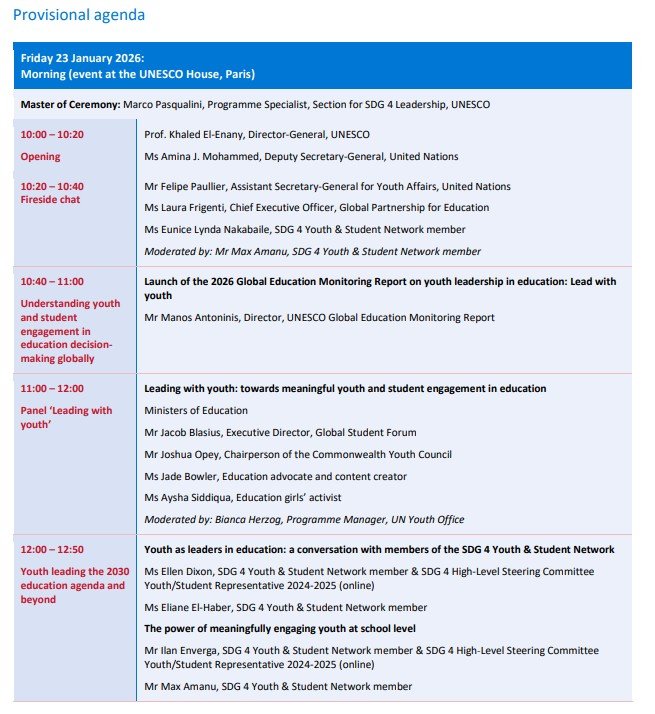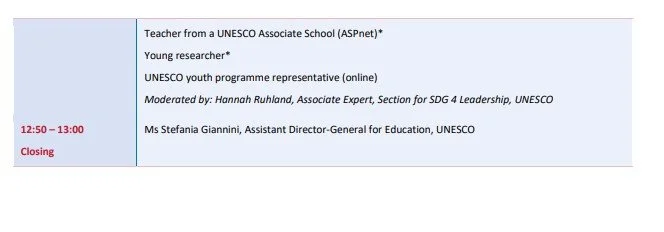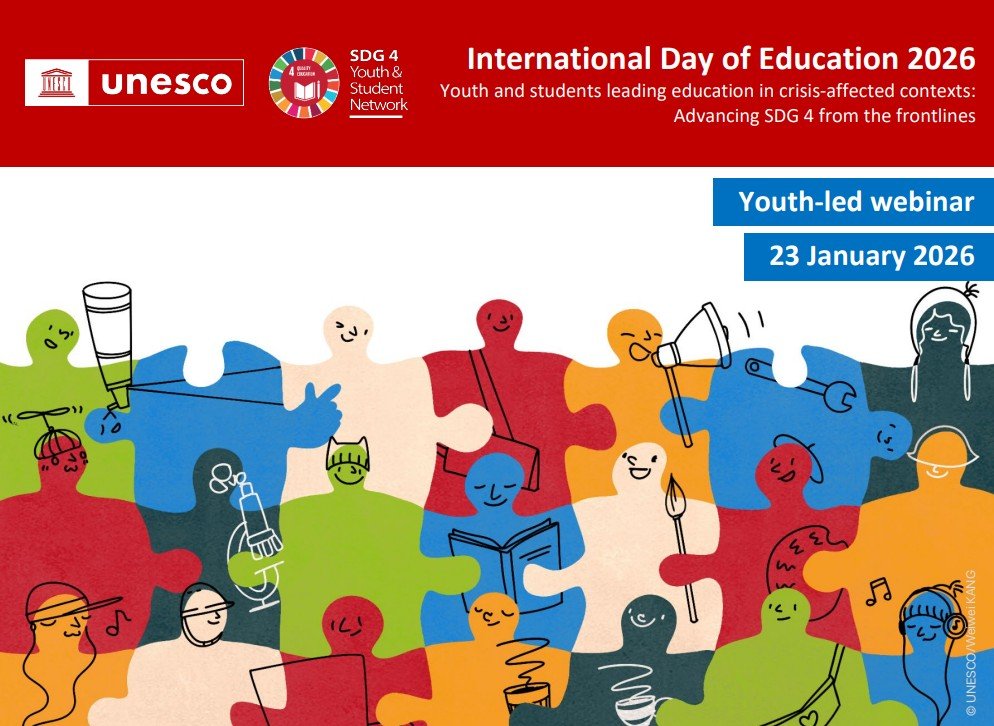PURPOSE: The United Nations General Assembly proclaimed 24 January as International Day of Education, in celebration of the role of education for peace and development. Education transforms lives and breaks the cycle of poverty that traps so many children. Education for girls is essential — an educated mother will make sure her children go to and stay in school. This is fundamental, especially when more than 250 million children and youth are out of school globally, and most of those in school are not acquiring the basic skills. Additionally, 44 million teachers are needed to achieve universal primary and secondary education by 2030. These challenges are compounded further by the lack of adequate resources for education. More than 70% of countries allocate less than 4% of GDP to education.
FORUM: ‘‘The power of youth in co-creating education.’’ International Day of Education 2026. Youth under 30 constitute more than half of the global population. They are a driving force for sustainable development, innovation and social transformation, yet they remain disproportionatelyaffected by poverty, inequality and limited access to quality education and decent work opportunities.When it comes to shaping the future of education, youth have a special role to play: they are the beneficiaries of education programmes and their future depends on it. For this reason, meaningfully engaging students and youth in co-creating the education they want is essential to meet their aspirations and ambitions. This is particularly true at a time of radical transformation induced by the technological revolution, which calls for rethinking the purpose and modalities of teaching and learning.This commitment aligns with the 2030 Agenda for Sustainable Development, which recognizes the role of youth as agents of change in achieving inclusive and equitable quality education and building peaceful, just and inclusive societies. Although progress has been made in involving young people and students in global decision making in education – including by securing them a permanent seat alongside global leaders in the SDG 4 High-Level Steering Committee – more needs to be done to ensure they are co-creators of education systems at all levels: at school, at country level, in international development cooperation programmes and so. The Youth Declaration on Transforming Education is a tangible result of youth’s willingness and capacity to contribute to strategic dialogues in education. Their initiatives at grassroots level, where young people play an instrumental role in supporting their peers with the provision of education – especiallyin crisis situations – are instrumental to take informed decisions: they need to be better brought to light, mainstreamed and considered. This year’s International Day of Education will celebrate the power of youth as co-creators of education. This will be done by: 1. Taking stock of national efforts to involve youth in educational decision-making, through anew report by the UNESCO Global Education Monitoring Report team, in partnership with theUN Youth Office, which measures student and youth participation in education laws and policy-making. R equested by the SDG4 High-Level Steering Committee in 2022, this new measurementholds countries accountable for the ir commitments to meaningfully engage youth made at the United Nations’ Transforming Education Summit and in the Pact for the Future. 2. Showcasing how UNESCO is leading the way by giving youth a voice in decision-making bodies such as the SDG 4 High -Level Steering Committee, placing them at the centre of global consultations for the post -2030 education agenda and amplifying their voices through UNESCO networks such as ASP net, SDG4 Youth & Student Network, the Global Youth Community, and the Youth Climate Action Network. On the ground, UNESCO empowers youth as leaders and changemakers, notably in crisis-affected contexts. 3. Introducing tools to ensure meaningful youth engagement in education at school and beyond, which were developed by the SDG4 Youth & Student Network and the UNESCO Associated Schools Network. 4. Highlighting youth-led initiatives in crisis-affected contexts that help safeguard the right to education for all, particularly for the most marginalized. Follow the conversations with the hashtags: #EndLearningPoverty, #Education2030, #DayofEducation, #24January, #EducationforPeace, #Learningforpeace, #education, SDG4.
EVENTS: On Saturday, January 24th, The UNESCO and its member states will mark the International Day of Education 2026 under the theme “The power of youth in co-creating education.” On Friday, January 23rd; From 10:00 a.m. to 17:00 p.m at UNESCO HQ Paris, Room I and Room VII; The global celebration will highlight how young people are shaping the future of learning and how everyone can help amplify their leadership. Youth under 30 make up more than half the world’s population, yet they remain underrepresented in education decision-making. By participating you help build a global movement advocating for inclusive, relevant and youth-centered education systems. The Observance of the International Day of Education 2026 will be marked through youth-led and participatory celebrations:
• A global event convening youth and students alongside international decision-makers will be hosted at UNESCO Headquarters in Paris on 23 January 2026 from 10 am to 1 pm (Paris time).
• An online youth-led event will feature young people’s stories and their role in advancing quality education in conflict-affected contexts on 23 January 2026 from 3 to 5 pm (Paris time). The event will be organized by the SDG 4 Youth & Student Network in cooperation with other UNESCO networks and partners, notably the UNESCO Associated Schools Network (ASPnet).
• An online action for youth and students to participate in the celebrations around International Day for Education will accompany other activities to drive visibility and engagement.
• The issuing of a call for good practices on meaningful youth engagement in education, which will be featured in the SDG 4 Knowledge Hub.
Register to participate (via indico), get the agenda programme and watch the livestream!
STATEMENTS: Read the Statement by the United Nations Secretary-General on International Day of Education 2026; January 24th and the Statement of the Director-General of the UNESCO on International Day of Education 2026; January 24th.
PODCASTS: The UNESCO is committed to supporting Member States to harness the potential of AI technologies for achieving the promise of lifelong learning opportunities for all, while ensuring that its application in the learning contexts is guided by the core principles of inclusion and equity. Listen to the audio-podcasts!
CAMPAIGN MATERIALS: Join the 2026 Campaign. Take action to End Learning Poverty through equitable, resilient, and effective education systems as well as lifelong learning opportunities. Explore the UNESCO’s ‘‘Right To Education’’ campaign and help spread the word to ensure that everyone has the right to education. Get the Communication materials!
WHY WE CELEBRATE IT!
For the first time in human history, an entire generation of children globally have had their education disrupted. And yet, this emergency comes on top of an existing learning crisis. Even before the pandemic struck, millions of children were not going to school and not learning.
ACTIONS
Generate visibility from local to global level on prioritizing education to reach the SDGs ahead of the SDG Summit, building on the outcomes of the TES.
Promote and showcase the national statements of commitment at country level and mobilize political and financial support for translating them into action.
Encourage wide take-up of the global initiatives launches at the TES to accelerate foundational learning, get every learner climate ready through greening education, promote public digital learning, advance gender equality in and through education and ensure learning continuity in situations of emergency and protracted crisis.
Advocate for higher levels of domestic and international financing, including through innovative sources, building on commitments at the TES.
Provide youth a platform to build on the TES youth declaration, relay their demands and showcase their initiatives and innovations to advance the right to education.
Rally influencers to push forward the global education movement calling on world leaders to stand by their commitments and prioritize investment in education and educational transformation.
Partners
The International Day of Education is organized in partnership with the UNESCO New York Office, UNHQ, the Global Partnership for Education and the Centre for Interdisciplinary Studies (CRI), the Global Education Coalition. With the participation of State governments, the International and Regional organizations, the Civil society organizations; rhe Non-Governmental Organizations, the teachers, The Education professionals, the private sector and academics.
Make a donation.
Every child deserves the opportunity to learn. We work around the world to reach those children who are missing out most on learning and education. Globally, we ensure that no child’s learning stops because they are caught up in crisis. Even before the COVID-19 pandemic struck, 258 million children were out of school, including 130 million girls. And even when children were at school, many were not learning. The world’s children deserve better.







